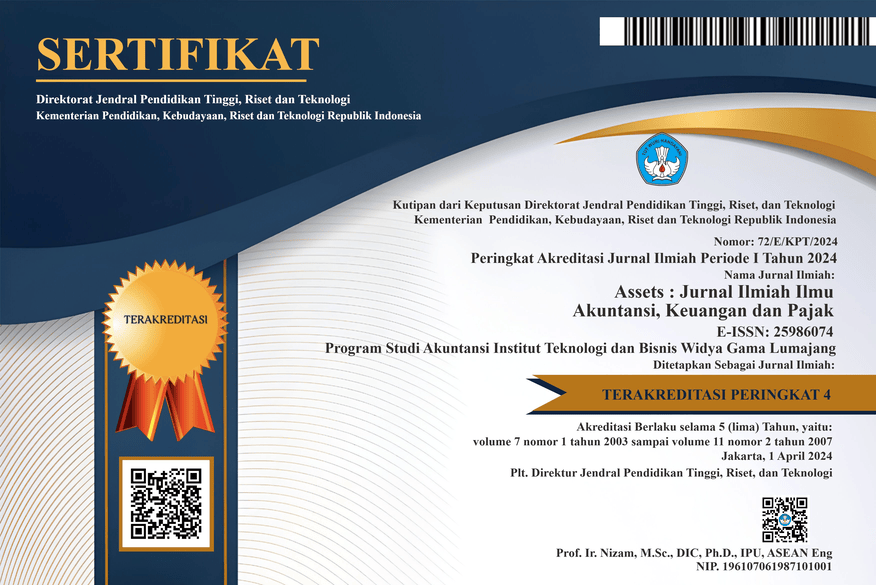The Influence of Internal Control and Individual Morality on Fraud Prevention in Industrial Garment Company
DOI:
https://doi.org/10.30741/assets.v9i1.1446Keywords:
Fraud Prevention, Individual Morality, Internal ControlAbstract
The purpose of this study is to ascertain whether fraud prevention at CV X, Bandung Regency, is impacted by internal control and personal ethics. Internal control and personal morality are the independent variables that are being examined in this study. Preventing fraud is the dependent variable. The quantitative descriptive approach method is the research methodology employed in this study. The study's population consisted of 58 workers at CV X Kab. Bandung. The census method with purposive sampling was the sample strategy employed in this investigation. 58 employees of CV X Kab. Bandung serve as the research's sample size. At a significance level of 5%, multiple linear regression analysis is the analysis approach employed in this study. Based on the results of the study, it shows that internal control, individual morality on fraud prevention at CV X Kab.bandung included in the good category. Besides that partial research results (t test) show that internal control affects fraud prevention in CV X Kab.bandung and individual morality affects fraud prevention in CV X Kab.bandung.
Downloads
References
Alyandy, D. Y., & Sari, R. P. (2022). Pengaruh Moralitas Individu Terhadap Kecenderungan Kecurangan Akuntansi (Studi Kasus Pada Pt Sinergitas Indonesia Muda). SENAPAN: Seminar Nasional Akuntansi Call for Paper UPN “VETERAN” JATIM, 2(2), 160–167.
Anandya, D., & Ramadhana, K. (2024). Laporan Hasil Pemantauan Tren Korupsi Tahun 2023. Indonesia Corruption Watch, 1–51.
Andhika Ligar Hardika, Supriyanto Ilyas, Paulus Sugianto Yusuf, Rini Susiani, & Syafdinal. (2024). Penerapan Pengendalian Internal Persediaan Untuk MencegahTindakan Kecurangan Umkm Kopi Cirengot. Edunomika, 8(1), 1–9.
Bisnis, M. (2022). Pengertian Fraud (Kecurangan) Menurut Para Ahli. Hestanto.Web.Id. https://www.hestanto.web.id/pengertian-fraud-kecurangan-menurut-para-ahli/#:~:text=Fraud adalah suatu bentuk penyimpangan dimana penerapan perilaku
Christina, N. dan V. (2015). Metodologi Penelitian Akuntansi dan Bisnis. Alfabeta.
Committee of Sponsoring Organizations. (2017). Enterprise Risk Management Integrating with strategy and performance. The Committee of Sponsoring Organizations of the Treadway Commission, I(June), 120. https://www.coso.org/Documents/2017-COSO-ERM-Integrating-with-Strategy-and-Performance-Executive-Summary.pdf
Faradiza, S. A. (2019). FRAUD PENTAGON DAN KECURANGAN LAPORAN KEUANGAN. Jurnal Ekonomi Dan Bisnis, 2, 1–22. https://www.researchgate.net/publication/338905524_FRAUD_PENTAGON_DAN_KECURANGAN_LAPORAN_KEUANGAN
Graham, J., Haidt, J., Koleva, S., Motyl, M., Iyer, R., Wojcik, S. P., & Ditto, P. H. (2012). Moral Foundations Theory: The Pragmatic Validity of Moral Pluralism. Advances in Experimental Social Psychology, 47, 55–130. https://doi.org/10.1016/B978-0-12-407236-7.00002-4
Hadian, N., Rufaidah, A. N., Vionica, V., Avionita, D., Ibrahin, I., Zumar, A., & Sinaga, O. (2021). The Effect Of Internal Control On Fraud Detection (Case Study On Several State-Owned Enterprises Banks In Bandung City). Review of International Geographical Education Online, 11(5), 1059–1064. https://doi.org/10.48047/rigeo.11.05.101
Haryanto, K., & Ardillah, K. (2022). The Impact of Internal Audit, Internal Control and Whistleblowing System on Fraud Prevention in the Indonesia Banking Companies during the COVID-19 Pandemic. Jurnal Ilmu Manajemen & Ekonomika, 14(1), 27. https://doi.org/10.35384/jime.v14i1.290
Herlita, S., & Bayunitri, B. I. (2021). PENGARUH PENGENDALIAN INTERNAL TERHADAP PENCEGAHAN KECURANGAN (Studi Kasus pada PT. Dirgantara Indonesia (Persero) Kota Bandung). Jurnal Akuntansi Bisnis Dan Ekonomi, 7(1), 1805–1830. https://doi.org/10.33197/jabe.vol7.iss1.2021.628
Karyono. (2013). Forensic Fraud. Andi.
Kesumawati, L. E., & Pramuki, N. M. W. A. (2021). Pengaruh Pengendalian Internal Dan Moralitas Individu Terhadap Kecurangan (Fraud). Hita Akuntansi Dan Keuangan, 2(2), 524–543. https://doi.org/10.32795/hak.v2i2.1570
Law (UU) No. 31/1999 on the Eradication of the Crime of Corruption (1999). https://peraturan.bpk.go.id/Details/45350/uu-no-31-tahun-1999
Marwoto, B. D. (2020). 10 pelaku pencurian di PT Pan Brothers Boyolali ditangkap. Jateng.Antarnews. https://jateng.antaranews.com/berita/348544/10-pelaku-pencurian-di-pt-pan-brothers-boyolali-ditangkap
Rini Susiani, S.E., M., Ak., Ak, C., & Acep Edison, DR., S.E., MM., A. (2017). Pengaruh Kualitas Audit Terhadap Efektifitas Pengendalian Internal. Journal Akuntansi Dan Audit, 2(3), 662–674. http://repository.widyatama.ac.id/handle/123456789/8511%0Ahttps://repository.widyatama.ac.id/xmlui/bitstream/handle/123456789/8511/Full Paper Rini Susiani %26 Acep Edison.pdf?sequence=1
Sugiyono. (2017). Metode Penelitian Kuantitatif, Kualitatif, dan R&D. Alfabeta.
Tampubolon, E., Rodiah, S., & Agustiawan, A. (2020). Pengaruh Pengendalian Internal dan Moralitas Individu Terhadap Kecurangan (Fraud) Akuntansi (Studi Eksperimen Pada Mahasiswa Universitas Muhammadiyah Riau). Reviu Akuntansi Dan Bisnis Indonesia, 4(1), 37–42. https://doi.org/10.18196/rab.040151
Taufik, M., & Dianita, M. (2020). The Effect of Internal Audit Againts Fraud Prevention (Case Study in PT. Asuransi Jasa Indonesia). Bisnis & Entrepreneurship, 14(2), 62–71. www.bpk.go.id
Udayani, A. A. K. F., & Sari, M. M. R. (2017). Penelitian ini bertujuan untuk mengetahui Pengaruh Pengendalian Internal dan Moralitas Individu pada Kecenderungan Kecurangan Akuntansi. Teori yang digunakan dalam penelitian ini adalah. Akuntansi Universitas Udayana, 18, 1774–1799.
Downloads
Published
How to Cite
Issue
Section
License
Copyright (c) 2025 Farida Azhari, Bunga Indah Bayunitri

This work is licensed under a Creative Commons Attribution-NonCommercial 4.0 International License.









